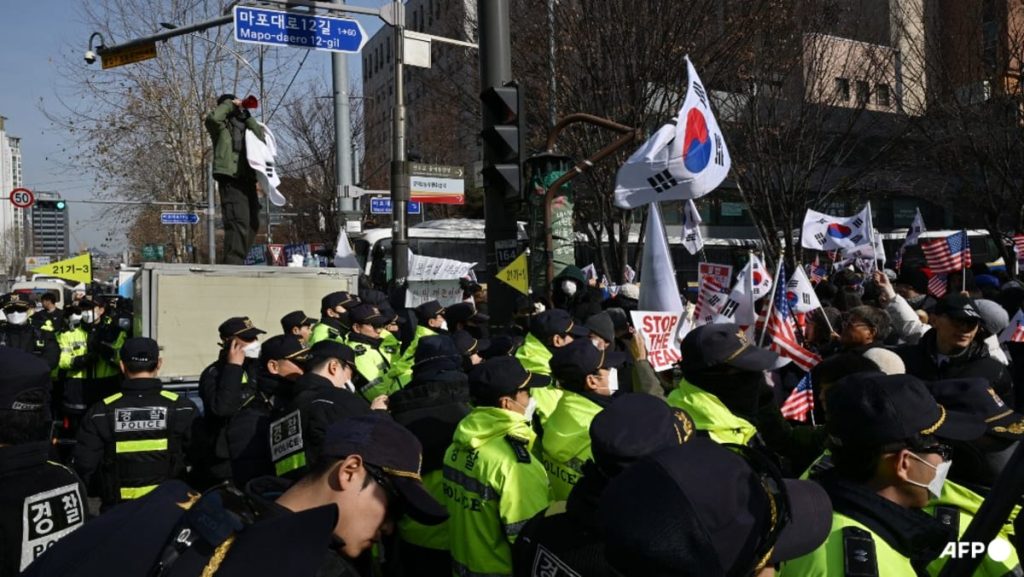The political landscape of South Korea is embroiled in a high-stakes drama surrounding President Yoon Suk-yeol, who faces detention, impeachment proceedings, and accusations of attempting to impose martial law. The president’s predicament stems from a confluence of factors, including allegations of corruption, a contentious relationship with the opposition-controlled parliament, and a deeply divided public opinion. Yoon’s decision to leave his compound and submit to detention, while simultaneously rejecting the legitimacy of the investigation, underscores the complex and volatile nature of the situation. His supporters, rallying outside the court with South Korean and American flags, represent a vocal segment of the population that views the proceedings as a politically motivated attack. The court’s decision to close its doors to the public, citing safety concerns, further emphasizes the tense atmosphere surrounding the case.
At the heart of the legal battle lies Yoon’s refusal to cooperate with investigators, citing his earlier explanation of his position upon detention. This stance has further fueled the opposition’s claims of obstruction and disregard for the legal process. Parallel to the detention proceedings, the Constitutional Court is deliberating on Yoon’s impeachment, a move initiated by the opposition Democratic Party. The outcome of this process will determine the president’s political future, with removal from office leading to snap elections within 60 days. Yoon’s absence from the initial impeachment hearings, while not unprecedented, adds another layer of complexity to the unfolding crisis. The ongoing legal battles, coupled with the president’s apparent unwillingness to engage directly with the investigative and judicial processes, contribute to the perception of a leader embattled and potentially detached from the legal and constitutional framework of the country.
The political dynamics underlying this crisis are deeply rooted in the power struggle between President Yoon and the opposition Democratic Party, which holds a majority in parliament. This dynamic creates a formidable challenge for Yoon, as the Democratic Party has the legislative power to pursue impeachment and other legal avenues against him. Their celebration of Yoon’s arrest as a step towards restoring constitutional order highlights the deep political divide and the opposition’s determination to remove him from power. The situation is further complicated by the passage of a bill to launch a special counsel probe into Yoon’s alleged attempt to impose martial law, a move that significantly escalates the legal and political pressures on the president. This investigation adds another layer of scrutiny to Yoon’s actions and underscores the seriousness of the allegations against him.
The ongoing events represent a significant challenge to South Korea’s democratic institutions and the rule of law. The president’s detention, the impeachment proceedings, and the special counsel investigation all contribute to an uncertain political climate. The public demonstrations, both in support of and against Yoon, reflect a deeply divided society grappling with fundamental questions about leadership, accountability, and the future direction of the country. The outcome of these legal and political processes will have far-reaching consequences for South Korea’s political stability and its relationship with international partners. The involvement of American flags in the protests suggests an awareness of the international implications of the crisis, and the potential impact on South Korea’s relationship with the United States, a key ally.
The convergence of these multiple legal and political challenges creates a highly volatile situation with significant implications for South Korea’s future. The president’s refusal to cooperate with investigators, coupled with the ongoing impeachment proceedings and the special counsel investigation, paints a picture of a leader facing an unprecedented crisis. The public demonstrations, both for and against Yoon, underscore the deep divisions within society. The court’s decision to restrict public access, citing safety concerns, further emphasizes the tense and uncertain atmosphere. The outcome of these processes will profoundly impact South Korea’s political landscape and the stability of its democratic institutions. The international community will undoubtedly be watching closely as the situation unfolds, particularly given South Korea’s strategic importance in the region.
The ongoing crisis surrounding President Yoon Suk-yeol represents a pivotal moment in South Korea’s political history. The confluence of detention, impeachment, and a special counsel investigation creates a highly charged atmosphere, with the potential for significant long-term consequences. The outcome of these proceedings will not only determine Yoon’s political fate but also shape the future direction of South Korean politics and its relationship with the international community. The deep divisions within society, reflected in the public demonstrations, highlight the urgent need for a resolution that upholds democratic principles and restores political stability. The international community, particularly South Korea’s allies, will be closely monitoring the situation as it unfolds, recognizing the potential for regional instability and the importance of maintaining a strong and democratic South Korea.

